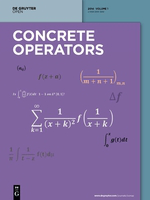
Concrete Operators
Scope & Guideline
Bridging Theory and Practice in Mathematical Analysis
Introduction
Aims and Scopes
- Operator Theory and Functional Analysis:
The journal emphasizes the study of linear operators, particularly in infinite-dimensional spaces, and explores their properties, including compactness, spectrum, and spectral radius. - Composition and Weighted Operators:
A significant focus is placed on composition operators, especially weighted composition operators, which are vital in various mathematical applications, including function spaces. - Applications of Operators in Various Mathematical Areas:
Research often links operator theory to other areas such as harmonic analysis, complex analysis, and numerical analysis, showcasing the interdisciplinary nature of the field. - Emerging Topics in Non-conventional Operators:
The journal also covers non-standard and generalized operators, including hypercyclic operators and those acting on spaces of functions, reflecting a trend towards exploring broader operator classes. - Spectral Theory and Asymptotic Analysis:
There is a consistent focus on spectral theory, including the study of eigenvalues and asymptotic behavior of operators, which is crucial for understanding their long-term behavior and stability.
Trending and Emerging
- Hypercyclicity and Non-conventional Dynamics:
There is a growing interest in hypercyclic operators and their dynamics, reflecting a trend towards understanding complex behaviors in operator theory and their implications in functional spaces. - Weighted Composition Operators:
Research on weighted composition operators has gained momentum, indicating a shift towards exploring their properties and applications, particularly in the context of Hardy and Bergmann spaces. - Generalized and Non-standard Operators:
An increase in studies involving generalized operators, such as tensor products and abstract multiplication operators, suggests a broadening of the scope of operator theory to include more innovative and diverse classes. - Spectral and Asymptotic Analysis of Operators:
There is an emergent focus on spectral theory and the asymptotic analysis of operators, which is crucial for understanding operator behavior in various mathematical contexts, including perturbation theory. - Interconnections with Other Mathematical Disciplines:
The journal is increasingly publishing papers that explore connections between operator theory and other fields such as complex analysis, indicating a trend towards interdisciplinary research.
Declining or Waning
- Traditional Operator Classes:
There has been a noticeable decline in publications focusing on classical operator classes, such as bounded linear operators, as research shifts towards more complex and generalized forms of operators. - Basic Functional Analysis Techniques:
Papers centered on elementary functional analysis concepts are less frequent, suggesting a move towards advanced applications and theoretical developments rather than foundational topics. - Low-dimensional or Finite-dimensional Operators:
Research on operators in finite-dimensional spaces is becoming less prevalent, as the journal increasingly emphasizes infinite-dimensional spaces and more complex operator structures.
Similar Journals
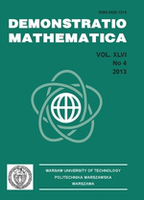
Demonstratio Mathematica
Unveiling the Beauty of Mathematical ConceptsDemonstratio Mathematica, published by DE GRUYTER POLAND SP Z O O, is an esteemed open-access journal in the field of mathematics, with an ISSN of 0420-1213 and E-ISSN 2391-4661. Established in 1996 and providing open access since 2009, it has become a vital platform for disseminating innovative research and advancements in various areas of mathematics. With a commendable Scopus ranking of 85/399 in General Mathematics and a 2023 Category Quartile of Q2, it stands at the forefront of the mathematical community, demonstrating a significant impact within the top 78th percentile. The journal aims to foster a deeper understanding and appreciation of mathematical concepts and their applications, catering to both seasoned researchers and emerging scholars. Located in Warsaw, Poland, Demonstratio Mathematica not only enriches the academic discourse but also strengthens collaborative efforts within the international mathematics community, making it an essential resource for those seeking to expand their knowledge and research output.
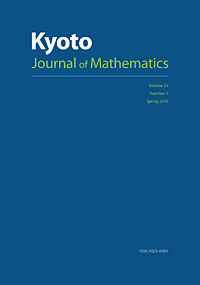
Kyoto Journal of Mathematics
Fostering innovation in mathematics for a brighter future.Kyoto Journal of Mathematics is a premier academic publication dedicated to advancing the field of mathematics, published by DUKE UNIVERSITY PRESS. Established in 1996, this journal serves as a vital platform for sharing innovative research and breakthrough studies across various mathematical disciplines. The journal has consistently maintained a prestigious Q1 ranking in the category of Mathematics (miscellaneous) as of 2023, reflecting its significant impact and contribution to the mathematical community. With its Open Access policy, the Kyoto Journal of Mathematics ensures that groundbreaking research is easily accessible to a global audience, fostering collaboration and knowledge dissemination among researchers, professionals, and students alike. The journal's commitment to excellence and relevance in mathematical research is underscored by its extensive archive of published works and its continuous engagement with contemporary mathematical challenges. This makes the journal an essential resource for anyone seeking to stay abreast of current trends and advancements in the field.

JOURNAL OF OPERATOR THEORY
Connecting Theory and Application in MathematicsJOURNAL OF OPERATOR THEORY is a distinguished periodical published by the THETA FOUNDATION based in Romania. With a specific focus on the realms of mathematics, particularly in the areas of operator theory and its applications in algebra and number theory, this journal plays a crucial role in disseminating high-quality research that advances theoretical understanding and practical applications. It is indexed with an impressive rank of #58 out of 119 in the Scopus Mathematics category, placing it within the 51st percentile nationally. The journal has evolved significantly since its establishment, with publications spanning from 1996 through 2024, and maintaining a reputable stature in the Q2 quartile for Algebra and Number Theory as of 2023. While it operates under a subscription model, the JOURNAL OF OPERATOR THEORY remains an essential resource for researchers, professionals, and students seeking to engage deeply with contemporary mathematical issues and promote advancements in the field. For those looking to explore innovative findings and methodological approaches, this journal is indispensable.
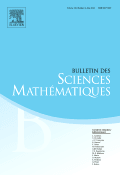
BULLETIN DES SCIENCES MATHEMATIQUES
Fostering Collaboration Through Mathematical ExcellenceBULLETIN DES SCIENCES MATHEMATIQUES, published by Elsevier, is an esteemed journal dedicated to the field of mathematics, particularly excelling in miscellaneous mathematical disciplines. With an impressive Q1 category quartile ranking in 2023, it positions itself among the top tier of journals in its field, reflecting its commitment to high-quality research and scholarship. The journal operates under the ISSN 0007-4497 and E-ISSN 1952-4773, facilitating a robust platform for sharing pioneering mathematical theories and applications. Researchers, professionals, and students will find invaluable insights and comprehensive studies here, aiding in the advancement of mathematical knowledge and fostering collaboration across disciplines. The journal's comprehensive scope includes a broad range of topics, ensuring it remains at the forefront of mathematical research until its convergence in 2024. Whether you are seeking to publish groundbreaking findings or to stay updated with the latest advancements in mathematics, the BULLETIN DES SCIENCES MATHEMATIQUES is a definitive resource for the academic community.

Commentationes Mathematicae Universitatis Carolinae
Fostering Mathematical Discourse and DiscoveryCommentationes Mathematicae Universitatis Carolinae, with ISSN 0010-2628 and E-ISSN 1213-7243, is a distinguished academic journal published by the Faculty of Mathematics and Physics at Charles University in the Czech Republic. Established in 1996, this journal serves as a platform for original research articles and contributions in the field of mathematics, catering to a diverse range of topics within the discipline. While classified in the Q4 quartile for 2023, it occupies an important niche within the mathematical community, particularly for emerging research and comprehensive studies. Although it is not open access, it offers authors an opportunity to disseminate their work through a reputable publisher, renowned for its scholarly contributions. With a focus on fostering academic discourse, Commentationes Mathematicae aims to engage researchers, professionals, and students alike, enriching the mathematical landscape and promoting collaboration within the field.

Sahand Communications in Mathematical Analysis
Bridging theory and application in mathematical research.Sahand Communications in Mathematical Analysis is a distinguished open-access journal published by the University of Maragheh in Iran, dedicated to the field of mathematical analysis and its applied branches. Since its inception in 2014, the journal has provided a valuable platform for researchers to disseminate significant findings in areas ranging from analytical methods to numerical analysis and applied mathematics. Despite its relatively recent establishment, the journal has quickly gained recognition, noted for its Q3 rankings in both Applied Mathematics and Numerical Analysis categories, and its Q4 ranking in Analysis for 2023. With an ambition to foster innovative research and facilitate scholarly dialogue, Sahand Communications in Mathematical Analysis aims to support the global mathematical community by ensuring unrestricted access to high-quality research outputs. Researchers, professionals, and students can look forward to engaging content that pushes the boundaries of mathematical inquiry through its open-access model, thus enhancing the accessibility and reach of critical mathematical discussions.

JOURNAL OF FOURIER ANALYSIS AND APPLICATIONS
Transforming Mathematical Concepts into Real-world SolutionsWelcome to the JOURNAL OF FOURIER ANALYSIS AND APPLICATIONS, a leading publication in the fields of Analysis, Applied Mathematics, and Mathematics (miscellaneous), published by Springer Birkhäuser. With a focus on both theoretical advancements and practical applications of Fourier analysis, this journal fosters innovation and collaboration among researchers, professionals, and students. Operating since 1994 and continuing its mission through 2024, the journal boasts a prestigious Q1 ranking in its categories and ranks within the top percentiles of Scopus, making it a vital resource for cutting-edge research and developments in its field. Though it is not an Open Access journal, it offers a comprehensive mix of original research articles, review papers, and networking opportunities for those passionate about mathematical sciences. Join a vibrant community aimed at further exploring and applying Fourier analysis concepts across various domains!

Computational Methods and Function Theory
Bridging theory and application in mathematical sciences.Computational Methods and Function Theory is a distinguished journal published by SPRINGER HEIDELBERG, dedicated to advancing the fields of computational mathematics and functional analysis. With its ISSN 1617-9447 and E-ISSN 2195-3724, this journal serves as a vital resource for researchers, professionals, and students seeking to explore state-of-the-art methodologies and theoretical developments from 2011 to 2024. Its robust ranking positions it in the Q3 category for Analysis and Computational Theory and Mathematics, and Q2 for Applied Mathematics, reflecting the journal's influence and credibility within the scientific community. Residing in Germany, the journal promotes open dialogue and innovative solutions to complex mathematical problems, making significant contributions to both theoretical and applied disciplines. Its impact is evidenced by strong Scopus rankings, asserting its relevance and rigorous peer-review processes, which ensure high-quality publications. This journal stands as a key platform for disseminating groundbreaking research and fostering collaboration across disciplines.
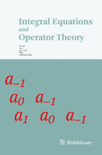
INTEGRAL EQUATIONS AND OPERATOR THEORY
Catalyzing growth in integral equations and operator studies.INTEGRAL EQUATIONS AND OPERATOR THEORY, published by SPRINGER BASEL AG, stands at the forefront of research in the fields of algebra, number theory, and analysis, with an esteemed categorization of Q2 in both disciplines as of 2023. With its ISSN 0378-620X and E-ISSN 1420-8989, this journal not only maintains a rigorous standard for scholarly contributions but also offers a vital platform for discourse on theoretical and applied aspects of integral equations and operator theory. Established in 1978, it has nurtured academic growth and innovation, with contributions continuing up to 2024. The journal holds respectable Scopus rankings, placed 43rd out of 119 in Algebra and Number Theory, and 110th out of 193 in Analysis, establishing its relevance and impact within the mathematical community. Researchers, professionals, and students alike will find INTEGRAL EQUATIONS AND OPERATOR THEORY to be an invaluable resource for advancing knowledge, fostering collaboration, and inspiring future studies within these critical areas of mathematics.

Constructive Mathematical Analysis
Unlocking New Perspectives in Constructive Mathematical ScienceConstructive Mathematical Analysis is a distinguished open-access journal dedicated to advancing the field of mathematical analysis, specifically through constructive methods. Published by Tuncer ACAR and affiliated with Selcuk University in Turkey, this journal has been making a significant impact in the academic community since its inception in 2018. With an emerging presence in Scopus, it has earned a Q2 ranking in key categories including Analysis, Applied Mathematics, and Numerical Analysis for 2023, reflecting its commitment to high-quality research contributions. By providing a platform for innovative research and interdisciplinary approaches, "Constructive Mathematical Analysis" aims to facilitate collaboration among researchers, educators, and students in their pursuit of knowledge in mathematical science. With its open-access model, the journal ensures that research findings are accessible to a global audience, fostering an inclusive academic environment.